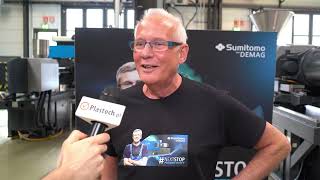 Teknor Apex produces first commercial biovinyl flexible vinyl compounds made with Dow Ecolibrium bio-based plasticizers.
Teknor Apex produces first commercial biovinyl flexible vinyl compounds made with Dow Ecolibrium bio-based plasticizers.Teknor Apex produces first commercial biovinyl flexible vinyl compounds
Teknor Apex Company has developed flexible vinyl compounds with plasticizers based on renewable resources for applications as diverse as automotive window encapsulation, medical tubing, and footwear, and it is prepared to supply the compounds to manufacturers seeking to reduce the carbon footprint of their products, the company announced at NPE2012.
New BioVinyl flexible vinyl compounds have already found commercial uses. Three of these are a line of fashionable “flip-flop” sandals produced in the U.S. by Okabashi Brands, Inc.; a range of shoe welting manufactured by custom extrusion processor Barbour Plastics, Inc.; and a new series of Tuff-Seal interlocking floor tile from Flooring Adventures.
BioVinyl compounds incorporate phthalate-free DOW Ecolibrium Bio-Based Plasticizers, which are manufactured using plant byproducts by Dow Electrical and Telecommunications (Dow E&T), a unit of The Dow Chemical Company. Under a recently announced Joint Collaboration Agreement, Teknor Apex has been granted the exclusive right to market in North America flexible vinyl compounds containing DOW Ecolibrium Bio-Based Plasticizers in certain applications. Life cycle analysis tests conducted by Dow and reviewed by a third party indicate that every ton of vinyl compound made flexible with DOW Ecolibrium Bio-Based Plasticizer helps the industry reduce carbon dioxide equivalent emissions by 0.7 ton, or 41%.
“BioVinyl compounds possess a lower global-warming potential than conventional flexible vinyl, and their carbon footprint reduction is even greater in comparison with non-vinyl plastics,” said Louis R. Cappucci, vice president in charge of the Vinyl Division of Teknor Apex. “Our tests of diverse BioVinyl grades indicate that customers can gain these environmental advantages without sacrificing product performance, and at a cost that is competitive with flexible vinyl containing non-phthalate plasticizers.”
Applications for which Teknor Apex is prepared to supply commercial quantities of BioVinyl compounds include:
● Automotive window seals, interior and exterior trim, and instrument panel skins.
● Medical tubing, masks, and collection bags.
● Consumer products such as footwear and toys.
Development work continues on compounds for other applications, such as blood bags and wire and cable jacketing, according to business development manager Michael Roberts.
“Because half of the PVC polymer is derived from seawater and typical plasticizer loadings are 33%, the substitution of the new plasticizers for conventional phthalates makes the carbon footprint of BioVinyl compounds dramatically smaller than that of many plastics,” said Roberts. “Teknor Apex has compiled comparative data indicating that the global warming potential of BioVinyl compounds, in terms of CO2 emission equivalents, is half that of polyolefin resins and is even lower than that of PLA bioplastic. The cumulative energy demand of BioVinyl compounds, including feedstock and processing, is the lowest in comparison with a wide range of plastics.”
Another advantage of BioVinyl compounds cited by Roberts stems from the fact that DOW Ecolibrium Bio-Based Plasticizers are derived from naturally occurring vegetable substances that are not used for food and so are unaffected by supply/demand forces impacting other bio-derived plastics feedstocks such as corn starch.
In work on formulations incorporating DOW Ecolibrium, Teknor Apex researchers developed and tested BioVinyl grades for a number of standard flexible vinyl applications, such as building and construction seals and gaskets and irrigation tubing.
“The most pronounced property change that we discovered in comparison with conventional phthalate-plasticized compounds was an improvement in heat stability, enabling extrusion processors to carry out longer product runs without prohibitive levels of polymer degradation,” said senior development chemist Nicole Marshall. “In addition, compounds that we developed for weatherstripping and gasketing showed significantly less color change than standard vinyl after accelerated weathering.”
Teknor Apex researchers also found that the Dow bio-based plasticizer exhibited greater plasticizing efficiency than most common phthalates. “In preparing developmental BioVinyl grades, we were able to use less plasticizer to obtain the same level of flexibility as in corresponding phthalate-based compounds,” Marshall said.


